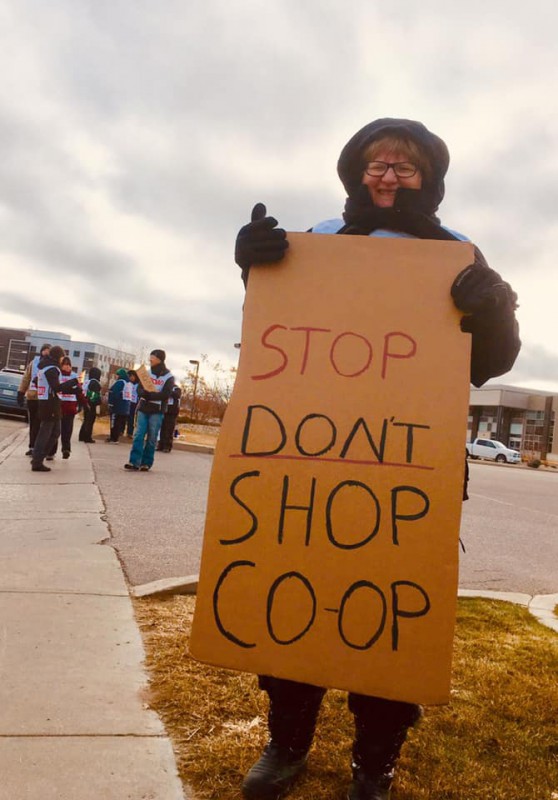What happened to the Co-op?

Marina Djurdjevic
On November 1, 2018, after two years without a contract, an estimated 900 workers at the Saskatoon Co-op walked off the job. Their primary complaint was the Co-op’s proposal of a two-tiered wage structure that would put an end to equal pay for equal work and see new hires paid significantly less than their counterparts. In the bitter months that followed, workers endured the most brutal of prairie winters – and the most brutal of labour negotiations.
On April 17, after five months of picketing, the workers, who were represented by the United Food and Commercial Workers International Union (UFCW) Local 1400, accepted a contract that would see a two-tiered wage structure introduced, although with a significantly smaller gap between new hires and old hands, pay equity through a profit-sharing mechanism for new hires, as well as a 2 per cent-per-year wage increase, retroactive pay to 2016, and a signing bonus. But although workers are back on the job, for the Saskatoon Co-op, the reckoning is yet to come.
The Saskatoon Co-op, which runs grocery and liquor stores, hardware stores, gas stations, and more in Saskatoon and the surrounding area, is a consumer co-operative (also known as a retail co-op) – meaning that it’s owned by its customers. Unlike a private corporation, which charges its customers as much as it can get away with in order to make the biggest profit for its owners, a consumer co-op ideally uses its profits to provide quality goods to its members at low prices. Profits stay in the community, and dividends are paid out to members. Along with nearly 200 other consumer co-operatives in Western Canada, the Saskatoon Co-op owns and is a member of Federated Co-operatives Limited (FCL), through which the co-operatives collectively purchase wholesale goods like food, petroleum, and building, agriculture, and livestock supplies. Because members are owners, the success of a consumer co-op depends on the politics of those members. When membership and leadership begin to see a co-operative as a source of profit and not a tool for equity, the co-operative system – and its workers – suffer most.
“There’s been a total breakdown in communications. Board members won’t talk to members. They say management speaks for the board.”
Dan Danielson, a retired farmer, author of three books including Local Leadership and Great Governance, and a lifelong Saskatoon Co-op member currently considering running for its board, says the roots of the dispute go much deeper than this year’s strike. According to Danielson, they stretch back to the 1980s, when Saskatchewan premier Grant Devine’s push toward privatization and conservatism challenged the province’s co-operative roots, cutting down Crown corporations and threatening the co-ops that had sustained the province even through the Depression. “In the ’80s, Federated [Co-operatives Limited, FCL] helped bail out some of the co-ops,” Danielson says. “And after that, [Federated] felt like they owned the co-op and wanted to turn it into a corporation.”
Danielson says the problem of FCL influence is particularly acute in Saskatoon, where Federated has their provincial headquarters – and where FCL management and staff have their co-op memberships. “When there’s an AGM [annual general meeting], Federated directs its people, who are also members of the co-op, to come over and elect people to the board who are usually former FCL directors or people that Federated can control.” A rule stating that members can only vote for board members if they’re physically present plus a room that can only hold a fraction of the Saskatoon Co-op’s roughly 100,000 members means Federated can “stack the deck,” Danielson says.
“It’s no secret what’s going on. Federated and the board that they hand-pick and select have decided that co-op principles don’t matter as long as they make a profit.” There are seven principles shared by co-operatives across the world, according to the International Co-operative Alliance: voluntary and open membership; democratic member control; member economic participation; autonomy and independence; education, training, and information; co-operation among co-operatives; and concern for community. But Danielson says the board no longer answers to members. “There’s been a total breakdown in communications,” he says. “Board members won’t talk to members. They say management speaks for the board.”
This stonewalling stems from what Don Kossick, a social activist and former co-op union organizer, calls “the Carver Model” of boards: the idea that the board should not have any interest in the way that co-operatives are being run by management on a day-to-day basis. “If management wants to go in and decide this is what the wages should be, that’s their business.” Kossick says this gives board members “an excuse not to interfere. But, he adds, “You can’t separate wages from policy, and the board sets the policy.”
“If a co-op organization doesn’t maintain an educational program so that the young people coming up understand what the co-operative principles are and what their forefathers struck out to do, those organizations will fail.”
Kossick agrees that FCL has a history of directing board members how to vote, citing an incident five years ago when Harold Chapman, one of the founders of the co-operative movement in Saskatchewan, tabled a resolution to fund and develop an educational program to teach the community about co-operative principles – education itself being one of those principles – and the board struck it down. Kossick, who attended that meeting, says that when he asked the board members why they would dismiss such a resolution, they told him, “We were told to vote to defeat that resolution.” The board did not respond to the Sask Dispatch’s request for a comment.
While the blatant interference was shocking to Kossick, the refusal to implement an educational system – a co-op principle – was not. “There used to be a co-op college,” he says, referring to the Western Co-operative College that was incorporated in Saskatoon in 1959. “It was there to teach the co-operative principles so we could make sure that managers worked within the principles of equity, sharing, democratic structures, and so on.” But, he says, during the late ’70s and early ’80s, “the managerial class destroyed it.” Danielson agrees that education is central to a co-operative’s success – and a lack of education is integral to its failure. “If a co-op organization doesn’t maintain an educational program so that the young people coming up understand what the co-operative principles are and what their forefathers struck out to do, those organizations will fail.”
During the strike, FCL’s influence played out in the media as well. On February 8, a little more than three months into the strike, the Saskatoon StarPhoenix, which covered the strike extensively, published a story about a teenage scab who said he crossed the picket line because “the union’s values didn’t align with what the company is trying to get at.” What the Star Phoenix didn’t disclose – and what Rank and File’s Emily Leedham later reported – was that the teen was the son of an FCL director. There’s no evidence that this was malice on the part of the Star Phoenix – the reporter did not respond to requests for comment – but it is a good representation of how little the public knows and understands about the relationship between the co-op and FCL.
It’s a little convoluted – Danielson admits that “it’s hard to get people to stop for a second and figure this stuff out” – but if members, who elect the board, own the co-op, and the co-op owns FCL, and FCL managers and directors are members of the co-op and pack the AGM in order to vote their hand-picked candidates to the board, then you have a board that effectively serves management. And management tries to run the co-operative like it’s any other corporation – maximizing profits and raising managerial salaries at the expense of co-operative principles.
“If you look at FCL today, it’s a large corporation in Canada and that’s because managers kept money coming in to the larger, more central organization of the co-operative.”
Another telling example of profits before people is the co-op’s reliance on refining and selling oil in the face of catastrophic climate change, leaving other, non-FCL affiliated grassroots co-operatives like Wascana Solar Co-op to pick up the slack when it comes to renewables. 2018 was a record year for FCL – it made nearly $1.1 billion in profits, in no small part because of the Co-op’s refinery in Regina. “If you look at FCL today, it’s a large corporation in Canada and that’s because managers kept money coming in to the larger, more central organization of the co-operative,” Kossick says.
Danielson says it’s this kind of mentality that ultimately led to the collapse of other Saskatchewan co-operatives, like the Wheat Pool. “The trick,” he says, “is to maintain co-operative principles and take advantage of the co-operative structure – local leadership, local membership, local ownership – as a selling point as opposed to ditching that and emulating other corporations.”
Photo by Jennifer Bowes
Andrew Stevens, an associate professor of industrial relations and human resource management at the University of Regina, says that by proposing a two-tiered pay system and by allowing workers to “freeze on the picket line all winter,” the co-op has done serious damage to their brand. “Financial sustainability is a relevant concern – at the same time, what are you doing to your brand if your brand is defined by a set of values and principles of co-operation, of respect, of equity and equality? How is that undermined when, by very definition, the labour strategy you’ve employed as an employer is working against that?” He adds that as a co-op member he wouldn’t cross the picket line to shop at the co-op. “I would go to a larger multinational.”
Danielson says a two-tiered pay system is simply not something that can exist alongside a co-operative ethos. “Equal pay for equal work is a co-operative principle. In fact, it’s just a good idea around good business and societal welfare.” Kossick agrees that two-tiered systems cannot be justified, adding that they serve a purpose far more sinister than cutting costs. “It’s designed to break unions.” He says that putting workers on two tiers, forcing some to do the same work for less pay, “cuts into the heart and solidarity of a union.”
“That mentality and austerity agenda found its way onto bargaining tables in the private sector. As a result, we have seen a couple strikes.”
Lori Johb, president of the Saskatchewan Federation of Labour, says the provincial government has played a role in a wave of companies, including the co-ops in Moose Jaw and Saskatoon, imposing two-tiered wage structures – which Johb calls “one of the worst forms of precarious labour” – on workers. It started when the Sask Party attempted to force a 3.5 per cent wage decrease on public-sector employees in 2017. “That mentality and austerity agenda found its way onto bargaining tables in the private sector. As a result, we have seen a couple strikes. There are lots of open collective agreements – many of which have been expired for years – and ultimately it’s working people that feel the negative impacts of that.”
Stevens agrees that the co-op strike has a lot to do with the overall attitude toward labour in Saskatchewan. “This needs to be seen in a broader context of living wages, of the Fight for $15, and a basic income.” He says that businesses like the Co-op, which are doing very well financially, are “using the overall economic situation in Saskatchewan to suggest that it’s hard times, when in reality they’re actually profitable.” Private-sector employers are using the government’s austerity measures to demand austerity themselves, even when their businesses are lucrative.
Photo by Jack Hicks
Johb adds that the government has a role in preventing strikebreakers from undermining picket-line solidarity. “We need anti-scab legislation,” she says. “A law that makes it illegal to cross a picket line will empower workers, and make employers think twice about forcing a strike or lockout.” Stevens agrees. “Bring[ing] in replacement workers tilts the balance of power in favour of the employer. If the employer was prevented from doing that, they would have to make do with the workers that were willing to cross the picket line and that would be it. Solidarity in the ranks would mean more.”
As the strike dragged on, a solidarity group calling itself Co-op Members for Fairness (CM4F) circulated a petition demanding that the board be replaced, ultimately garnering more than 300 signatures. Stevens calls the group “one of the most inspiring outcomes” of the protracted labour dispute, demonstrating how members and workers have a shared interest in ensuring the board adheres to the co-operative principles. It hasn’t always been that way, though – Kossick says that when he was mediating between unions and co-ops in the 1970s, “[y]ou could probably get a better deal from Safeway. That image of a nice, community-based co-operative that treats its workers fairly, treats membership fairly, and all that has to be looked at more closely. We need to get into the dynamics of how co-operatives operate. The battle is always over surplus value. If you want to pay dividends, you have to get those dividends off the backs of the worker.”
“I would be extremely worried that somewhere in some manager’s mind is the idea that ‘it’s not a big deal – we can easily become part of the private retail system.’ We’ve already seen it happen with the Wheat Pool and retail co-ops in the Maritimes.”
But when members are principled – and understand the principles of a co-op – “[they] believe in respecting workers and building the community, keeping wealth in the community,” says Kossick. And that means not crossing the picket line and fighting for a better board.
Unfortunately for members of the Saskatoon Co-op, the board rejected their attempts to take back the co-operative. On March 7, CM4F presented six resolutions to the board that they wanted to be read and debated at the June 20 AGM. The resolutions included allowing board elections to take place over five business days to allow members who could not be present on the day of the AGM to cast ballots, removing two-tier wage proposals from all past and future contracts and bargaining processes, and mandating that the board and CEO provide a full costing disclosure regarding who initiated and authorized the use of membership funds to support management opposition to striking workers.
The board rejected all of their resolutions, citing the Co-operatives Act, 1996 in their decision, a move that Danielson flatly rejects, saying “[p]olicy is a living document. Policy can always be changed.” He adds that CM4F has sought legal counsel, who told them there were no grounds for the board to reject their issues. “I do believe that if membership had more resources, things would be different.”
Kossick believes that the FCL-backed board will make another play for control at the AGM on June 20 – and that isn’t something he takes lightly. “They have a compliant board. They could say, ‘we can sell this [the co-op grocery store]. We could make some money and get some good dividends back’ and it becomes a different entity. I would be extremely worried that somewhere in some manager’s mind is the idea that ‘it’s not a big deal – we can easily become part of the private retail system.’ We’ve already seen it happen with the Wheat Pool and retail co-ops in the Maritimes.”
Despite these issues, one thing is clear: co-ops are worth fighting for, especially as Saskatchewan stares down a struggling economy. Part of the solution is to remember where they came from in the first place. “The co-op itself and the refinery [were] founded when a bunch of farmers had enough with the exploitation and the usury they were experiencing with largely American, British, and Eastern Canadian oil companies,” says Stevens.
Kossick agrees that looking to the past is key to finding solutions for the co-op’s future. “Co-ops were a major pillar of Saskatchewan’s economy. There was the government pillar, the private enterprise pillar, and there was the co-operative pillar. There was an ideological basis for co-operatives that people could understand. There was an emphasis on co-operatives. We wanted to make co-operatives work for everybody.”
“I think it could still be that way.”




